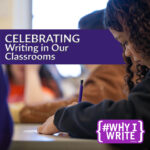 This blog post was written by NCTE member Gary R. Gray Jr. as part of a blog series celebrating the National Day on Writing®. To draw attention to the remarkable variety of writing we engage in and to help make all writers aware of their craft, the National Council of Teachers of English has established October 20 as the National Day on Writing®. Resources, strategies, and inclusion in a blog post does not imply endorsement or promotion by NCTE.
This blog post was written by NCTE member Gary R. Gray Jr. as part of a blog series celebrating the National Day on Writing®. To draw attention to the remarkable variety of writing we engage in and to help make all writers aware of their craft, the National Council of Teachers of English has established October 20 as the National Day on Writing®. Resources, strategies, and inclusion in a blog post does not imply endorsement or promotion by NCTE.
What’s good, y’all?
If you know me, you know I’m all about words. I love playing with them, moving them, twisting them, and letting them flow. Growing up, I was told to write like a robot: perfect grammar, boring sentences, and “academic.”
That wasn’t me,
I talked like my grandma,
Uncle Hank,
Aunt Marlene,
which was perfect enough for me.
This year, I’m back in grade 2 (after eight years), and my first thought was how do I help these kids discover the magic of words. To me, poetry is like a playground for your mind. It’s a place to be free, express yourself, and to see the world in a whole new way.
Poetry can do so much more than just rhyme. It offers us a channel to:
- Express our emotions: Whether we’re feeling happy, sad, angry, or confused, poetry allows us to give voice to our feelings in a creative and meaningful way.
- Open our eyes: Poetry can help us to see the world differently, challenging our perspectives and inspiring us to think outside the box.
- Build connections: Poetry can help us to understand and empathize with the experiences of others, fostering a sense of community and belonging.
- Sharpen our minds: Poetry can challenge us to think critically, analyze complex ideas and text, and consider different perspectives.
- Strengthen communication: Poetry can help us to develop clarity, conciseness, and effective use of language.
To help my students explore the world of poetry, I created a series of engaging stations.
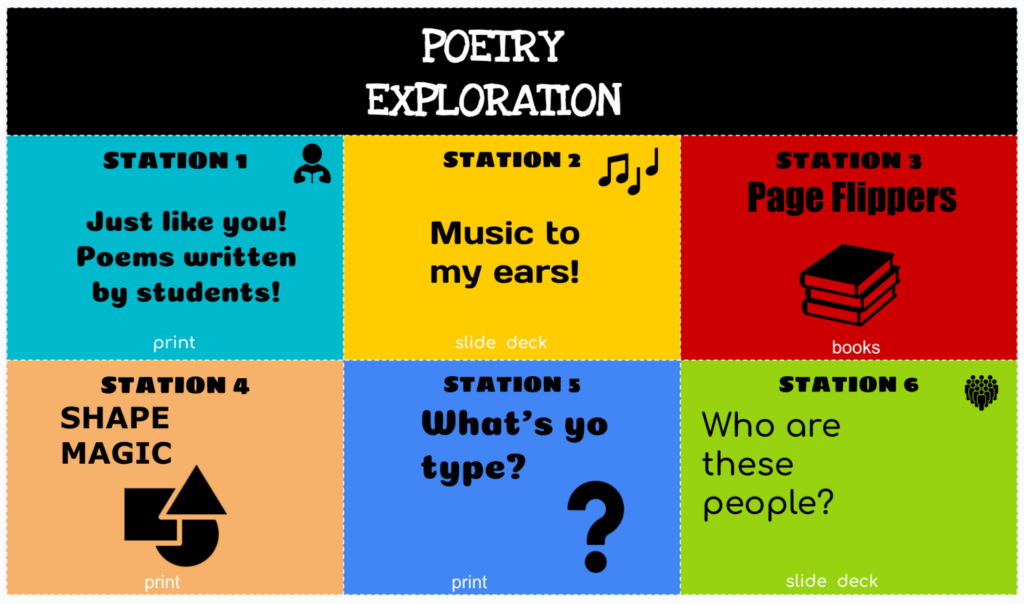
Above: Stations students explored during exploration
- Just like you! Poems written by students!: Read poems written by students from past years and watch slam poetry performances.
- Music to my ears!: Listen to songs by Katy Perry, Bruno Mars, and K’naan and analyze their poetic elements.
- Page Flippers: Read books like Love by Matt De La Peña and The Day You Begin by Jacqueline Woodson.
- Shape Magic: Explore poems that are shaped a little different.
- What’s yo type?: Explore shape poems, haiku, list poems, and more.
- Who are these people?: Learn about Langston Hughes, Xu Zhimo, and Ho Xuan Huong, and read their poems.
Each station was designed to spark curiosity and encourage exploration. Students worked together in groups, sharing their thoughts and ideas on anchor charts. They focused on three specific questions throughout:
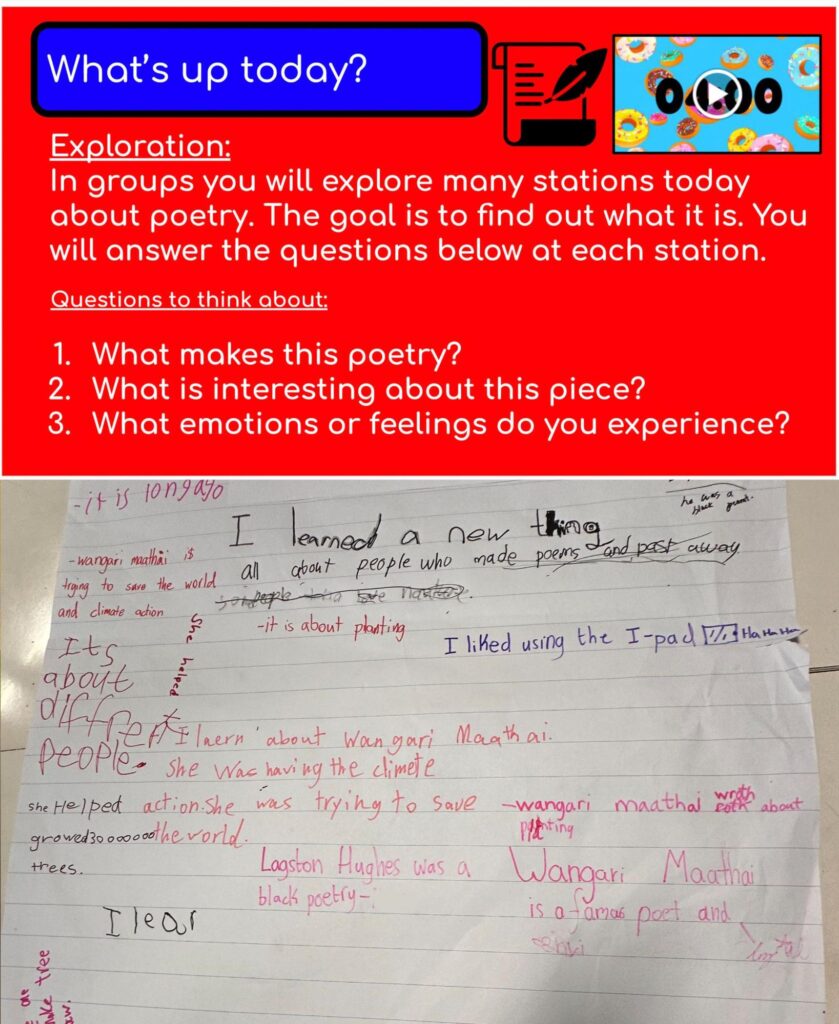
Above: Slide that shares what students will do at each station; Below: student response to Station 6
After completing the stations, we had a class discussion where students shared their observations and insights. We realized that poetry is more than just rhyme, a riddle, or a cute phrase. It’s a way to express yourself, have fun, and see the world in a new light.
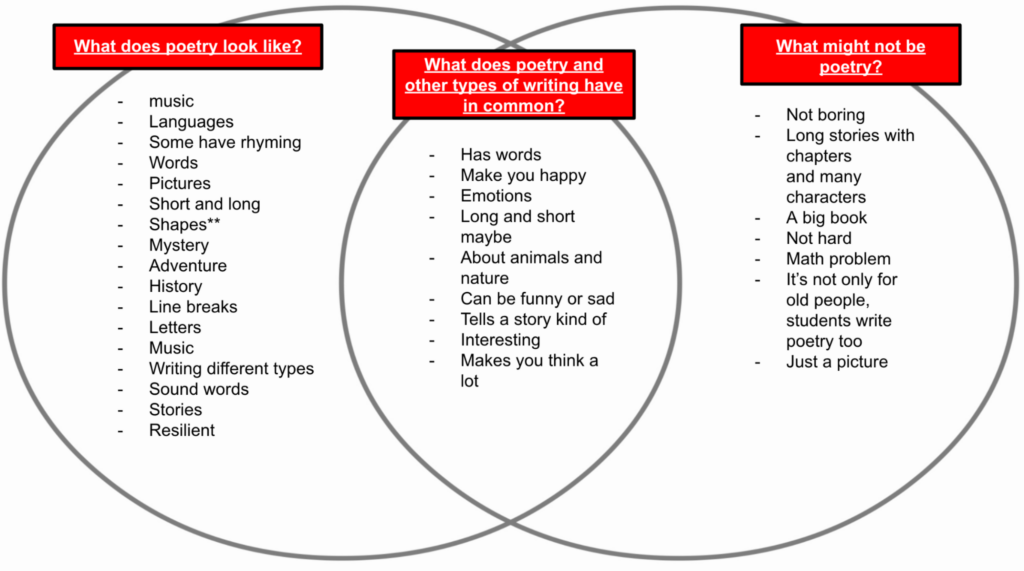
Venn diagram of class discussion after poetry exploration
One of my students said, “Gary, I thought poetry was just rhyme? It’s also about song and shapes?” And I was like, “Exactly, my dude! Poetry is about expressing yourself in many ways, and being you on the page, and having fun, and seeing the world in many ways. Forget about the spelling (for now), just get your thoughts out the way you want to.”
Unlike my journey, I was excited to see these kids discovering the power of words early on in their writing journey. It’s a way to connect with yourself and others, to tell stories, and to make the world a better place.
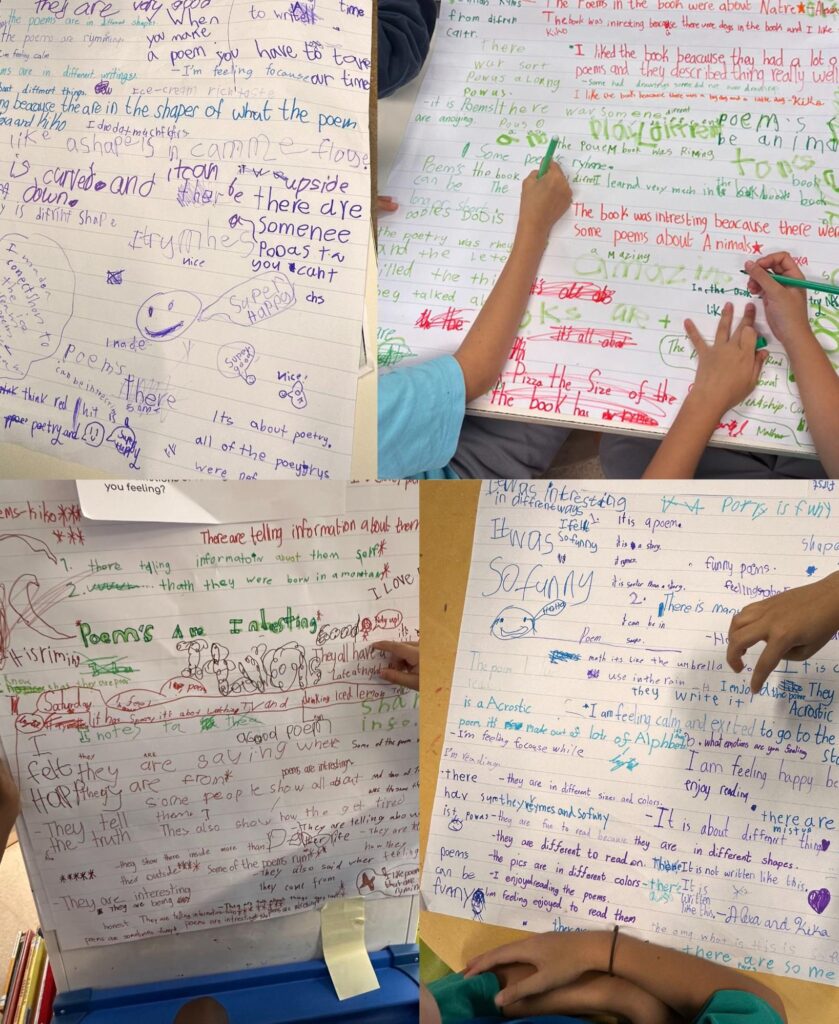
Student responses to exploration stations
Poetry is a gateway to liberation. When we allow students to “write” the way they want to, it can transform their mindset. They begin to see themselves as writers and young authors, and they become capable of expressing their thoughts and feelings in meaningful ways. This confidence can have a major impact on their overall self-esteem and relationship with words.
I strongly believe that spelling and grammar are important, but first, build a love for the pen to the page and self-expression. It will give them the freedom to try new things, play with words, and empower them to become lifelong writers.
Poetry is personal growth, self-discovery, and social change.
Poetry is everything.
Let’s let the kids play with words.
 Gary R. Gray Jr. is a Black Canadian poet and educator who writes for young children (and sometimes adults). Born and raised in Preston, Nova Scotia, Canada, Gray’s love for literature stems from told and untold stories within his community. Gray found inspiration in spoken word to begin writing in high school during a writing workshop by poet and professor Shauntay Grant. He did not read his first full novel until the age of 21.
Gary R. Gray Jr. is a Black Canadian poet and educator who writes for young children (and sometimes adults). Born and raised in Preston, Nova Scotia, Canada, Gray’s love for literature stems from told and untold stories within his community. Gray found inspiration in spoken word to begin writing in high school during a writing workshop by poet and professor Shauntay Grant. He did not read his first full novel until the age of 21.
Gray is the author of I’m From, illustrated by Oge Mora (Harper Collins/Balzer+Bray, 2023).
It is the policy of NCTE in all publications, including the Literacy & NCTE blog, to provide a forum for the open discussion of ideas concerning the content and the teaching of English and the language arts. Publicity accorded to any particular point of view does not imply endorsement by the Executive Committee, the Board of Directors, the staff, or the membership at large, except in announcements of policy, where such endorsement is clearly specified.

